Don't wanna be here? Send us removal request.
Text
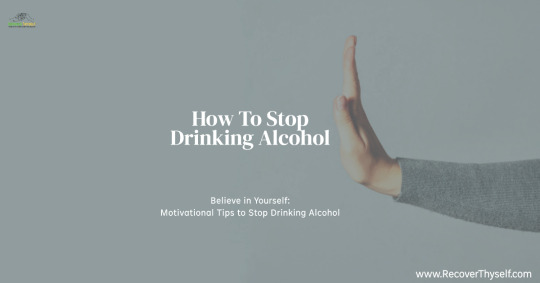
Ah, the age-old question: how does one stop drinking alcohol? Well, it's not as easy as putting down that glass of scotch and walking away. It's more like wrestling a greased pig - slippery and unpredictable. But fear not, there are some tried and true methods that can help. For starters, try finding a support group - the kind that doesn't revolve around beer pong. It's always helpful to have a group of people who understand what you're going through. And hey, if all else fails, just remember: alcohol may be temporary, but the hangover is forever. So think of the future headaches and skip the booze altogether. Your liver will thank you.
#BreakTheBottle#OvercomingAlcoholism#SoberLifeStartsNow#QuitDrinkingForGood#BreakingFreeFromAlcohol#AlcoholNoMore#BeatingTheBottle#ReclaimingSobriety#TheAlcoholFreeJourney#RisingAboveAlcoholism#FreedomFromAlcohol#TheSoberPathAhead#OneDayAtATime#BreakingTheCycleOfAddiction#SobrietyIsPossible#TheRoadToRecovery#ChoosingSobriety#TheFightAgainstAlcoholism#BattlingTheBottle#TheVictoryOverAlcoholism#recoverthyself#ThyselfRecovery#RecoverThyself#ThyselfRetreat
0 notes
Text

Alcoholism is a serious condition that can sneak up on you like a stealthy thief in the night. The red flags of alcoholism are subtle at first, but they become more apparent as the addiction takes hold. If you find yourself needing to drink more to feel the same effects, experiencing physical withdrawal symptoms when you don't drink, or feeling guilty or ashamed about your drinking habits, these are warning signs that should not be ignored. Additionally, if you find yourself constantly thinking about when you can have your next drink, or if your relationships, work, or daily life are negatively impacted by your drinking, it's time to take a step back and reassess your relationship with alcohol. Remember, it's never too late to seek help and make a change for the better.
#WarningSignsofAlcoholism#RedFlagsOfAddiction#SirensofAlcoholism#TheQuietThiefOfSobriety#SubtleIndicationsOfAddiction#TheSlowBurnOfAlcoholism#TheClingingCupsOfAddiction#TheUrgentThirstForAlcohol#TheSlowDeathOfAddiction#DrinkingAwayTheRedFlags#TheSilentDiseaseOfAlcoholism#TheHeavyPourOfAddiction#TheTelltaleSignsOfAlcoholism#TheLoudWhispersOfAddiction#TheHeavyHandOfAlcoholism#TheSlipperySlopeOfAddiction#TheWhispersOfAlcoholism#TheStealthyAdvanceOfAddiction#TheSubtleThreatOfAlcoholism#TheClamoringCryOfAddiction#recoverthyself#ThyselfRecovery#RecoverThyself#ThyselfRetreat
0 notes
Text

Well, well, well, it looks like someone might have had one too many glasses of fermented grape juice, eh? While a casual drink with friends can be fun, turning into a human keg is not. Signs and symptoms of alcoholism can vary from person to person, but generally, if you find yourself pouring more liquid courage into your cup than you used to, experiencing withdrawal symptoms or mood swings when you can't drink, and hiding your stash from others, you might have an issue. Don't worry, though, you're not alone - even the most impressive tanks need to be drained from time to time. Just be sure to ask for help when you need it, and don't be afraid to trade in your wine glass for a water bottle.
#AlcoholismRedFlags#PouringOutTheSigns#BottledUpSymptoms#BoozeInducedBehaviors#LiquorLacedWarningSigns#SpiritedAwayByAddiction#SippingOnSecrets#TippingPointToAlcoholism#BottomsUpToSymptoms#DrinkingToDistress#SunkInSpirits#BoozyBehaviors#WineDownWithAddiction#FuzzyLogicOfAlcoholism#BrewingUpTrouble#AlcoholismIsTheCure#BreakingTheSealOnSymptoms#TheHangoverOfAlcoholism#WineHangoverOrAddiction#recoverthyself#ThyselfRecovery#RecoverThyself#ThyselfRetreat
0 notes
Text
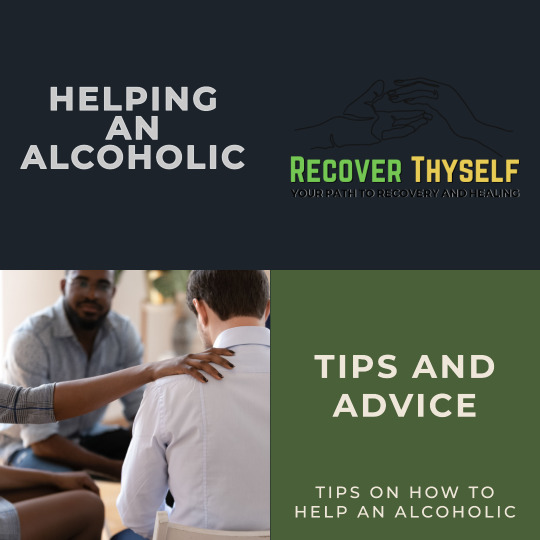
Helping an alcoholic is like trying to catch a slippery fish with your bare hands - it's tricky and it can be frustrating. But just like with fishing, there are some tips and tricks that can make the process a little easier. First and foremost, you have to be patient and persistent. You can't just cast your line and expect to catch a big one right away - it takes time and effort. Similarly, helping an alcoholic requires consistent support and encouragement, even when they may seem resistant or ungrateful. Second, you have to use the right bait. Just like with fishing, different fish prefer different kinds of bait. For an alcoholic, this means finding the right words and actions that will resonate with them and motivate them to make a change. Finally, it's important to know when to reel it in. You can't force someone to change, no matter how much you want to. At some point, you have to accept that you've done all you can and that it's up to the alcoholic to take the next step. So, grab your fishing rod and tackle box and get ready to help that slippery fish (aka your loved one) get back on track.
#FishingForRecovery#ReelingInTheRightSupport#BaitingAnAlcoholic#PatienceIsTheKeyToRecovery#CastingTheNetOfLove#UsingTheRightLureToMotivateChange#Don'tLetThemOffTheHook#ReelingThemInWithCompassion#ThrowingThemALifeline#NavigatingTheWatersOfAddiction#CatchingTheBigOneOfRecovery#FishingForHope#BattlingTheCurrentOfAddiction#HookedOnSupport#TheCatchAndReleaseOfRecovery#BaitingWithEncouragement#Don'tGetHookedOnEnabling#NavigatingTheRoughWatersOfRehab#ReelingInTheRightResources#FishingForAFreshStart#recoverthyself#ThyselfRecovery#RecoverThyself#ThyselfRetreat
0 notes
Text

Alcoholism is like a pot of boiling water - there are a lot of things that can make it boil over. Maybe it's the stress of work that's turning up the heat, or the pressure to fit in with your social group. Perhaps it's the memories of past trauma that are simmering just below the surface, or the simple fact that alcohol just tastes so darn good. Whatever the cause, alcoholism is like a soufflé that can fall flat at a moment's notice - and there are plenty of ingredients that can cause it to deflate. From genetics to mental health, there is a multitude of factors that can make you more susceptible to alcoholism. But just like with cooking, sometimes it's not about the individual ingredients - it's about the recipe as a whole. By understanding the common causes of alcoholism and working with a professional to create a personalized recipe for recovery, you can ensure that your soufflé (aka your recovery journey) stays fluffy and delicious.
#BoilingOverWithBooze#UnderTheInfluenceOfPressure#PourMeAnotherPintOfStress#CheersToTheTasteOfAlcohol#MixingGeneticsWithGin#MentalHealthAndMerlot#BrewingUpSomeTrauma#DrinkingToDrownSorrows#SippingOnSocialAnxiety#StirringUpSomeSelfMedication#WhippingUpARecipeForDisaster#OverindulgingInIntoxication#BlendingFamilyHistoryWithBourbon#PouringOutPain#BottlingUpEmotions#SpiritedAwayByAlcohol#DrunkOnDopamine#MixingAlcoholWithMisery#ShakenAndStirredByLife#SoberChefCreatingANewRecipe#recoverthyself#ThyselfRecovery#RecoverThyself#ThyselfRetreat
0 notes
Text
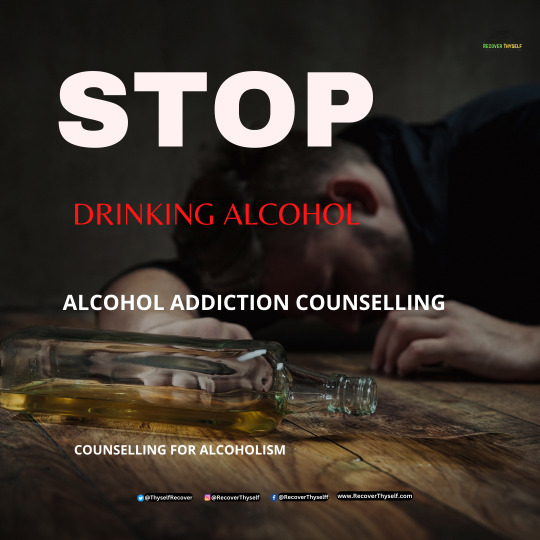
Breaking up with alcohol is like breaking up with a bad boyfriend or girlfriend - it's hard to do, but it's necessary for your own well-being. And just like you wouldn't try to do it alone, you shouldn't try to break up with alcohol alone either. That's where counseling comes in - think of it like a relationship coach for your relationship with alcohol. Your counselor can help you identify the patterns in your relationship with alcohol that is keeping you stuck, and develop strategies to move on. They can help you navigate the ups and downs of the breakup process, and provide a listening ear when you need to vent your frustrations. And just like any good relationship coach, they can help you celebrate the small victories along the way - whether it's going a day without a drink, or discovering a new hobby to fill the void. So if you're ready to break up with alcohol for good, don't do it alone - find yourself a relationship coach (aka a counselor) and let them guide you through the process. Who knows - you might just find the love of your life (aka sobriety) on the other side.
#SoberAndSassy#BoozeNoMore#WineFreeLife#DrunkNoMore#ByeByeBeerBelly#SoberLifeIsBetter#WineNotSayNo#DryMartiniDreams#AlcoholFreeAdventure#SoberNotSorry#SoberLivingIsBetter#NoMoreSips#CocktailFreeLife#SobrietySaves#ZeroProofFun#SoberThoughts#AlcoholFreeIsTheWayToBe#AlcoholSucks#SoberAF#BreakingUpWithAlcohol#recoverthyself#ThyselfRecovery#RecoverThyself#ThyselfRetreat
0 notes
Text
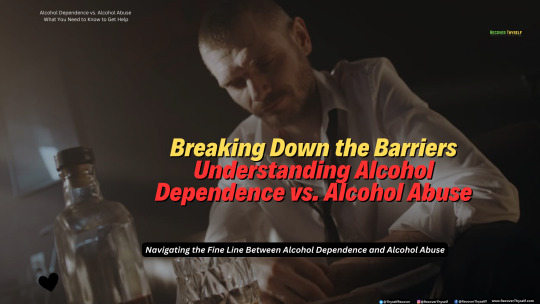
Alcohol Dependence Vs. Alcohol Abuse: What’s The Difference?
Alcohol Dependence and Alcohol Abuse may seem like two sides of the same coin, but they are very different beasts altogether. Think of it like a raging river - alcohol abuse is like getting caught in the current, tossed around, and battered by the waves. Alcohol dependence, on the other hand, is like being sucked down into a whirlpool, unable to break free. Alcohol abuse is characterized by reckless behavior, such as drinking and driving or getting into fights while intoxicated. Alcohol dependence, on the other hand, is marked by physical and psychological dependence on alcohol - meaning that your body and mind have become so accustomed to alcohol that you can't function without it. The symptoms of alcohol dependence can be frightening, from tremors and seizures to hallucinations and delirium. But with the right treatment, you can break free from the whirlpool of alcohol dependence and find solid ground once again. It's not an easy journey, but it's a journey that's worth taking - because on the other side of the whirlpool lies a life of sobriety, freedom, and hope.
#BreakingFreeFromTheWhirlpool#RidingTheCurrentOfChange#BreakingTheCycleOfAlcoholism#OvercomingTheDependence#BreakingTheChainsOfAddiction#AlcoholismTreatment#AlcoholAddictionRecovery#RisingAboveTheTide#FindingSolidGround#AlcoholAbuseAwareness#BreakingTheStigma#AlcoholRecoveryJourney#OvercomingTheStruggle#BreakingFreeFromTheDependence#AlcoholDependencyRecovery#ReclaimingMyLife#SoberAndStrong#SobrietyIsFreedom#EmbraceTheChange#recoverthyself#ThyselfRecovery#RecoverThyself#ThyselfRetreat
0 notes
Text

Alcohol Dependence Syndrome is like a heavy anchor that drags you down, making it nearly impossible to break free. It can make you feel trapped, alone, and hopeless - like you're drowning in a sea of your own addiction. But there is hope - and that hope comes in the form of counseling. Through counseling, you can learn to recognize the signs of Alcohol Dependence Syndrome and develop the skills you need to stay sober. Your counselor will help you explore the underlying reasons behind your addiction so that you can heal from the inside out. It's like shining a light into the murky depths of the ocean - revealing the hidden dangers and helping you navigate them safely. With the support of a trained counselor, you can rise above the tide of addiction and reclaim your life. It's not always an easy journey, but it's one that's worth taking. Because when you come out on the other side, you'll be amazed at the beauty of the world that awaits you.
#BreakingTheBottle#SoberLife#RisingAboveAddiction#RecoveryJourney#OvercomingDependency#BreakingFreeFromAlcohol#SobrietyIsFreedom#BreakingChainsOfAddiction#AlcoholFreeLife#BreakingAddictionCycle#EmbraceSobriety#RiseAboveTideOfAddiction#AlcoholDetox#BreakingTheGripOfAddiction#ReclaimingMyLife#SoberThoughts#AlcoholismRecovery#BreakingTheCycleOfDependency#StartingFresh#recoverthyself#ThyselfRecovery#RecoverThyself#ThyselfRetreat
0 notes
Text
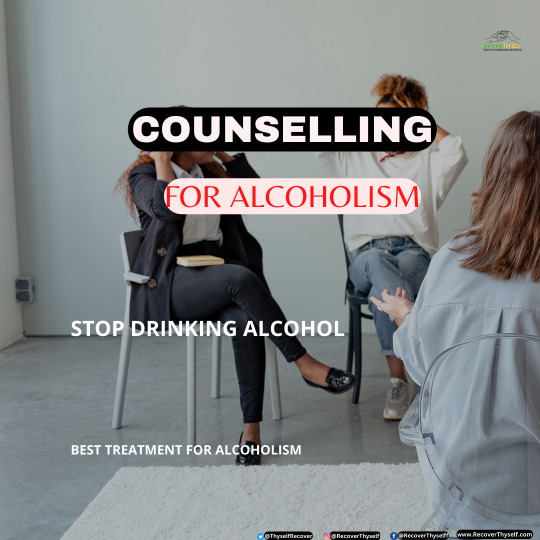
Breaking Free: Overcoming Alcoholism with Counseling.
When you're stuck in the grips of alcoholism, it can feel like you're drowning in a dark sea. Every day feels like a struggle to keep your head above water, and it can be hard to see a way out. But that's where counseling comes in - it's like a life raft that can pull you to safety. Through counseling, you can learn to identify the triggers that lead you to drink and develop coping mechanisms that will help you stay sober. You'll also have the opportunity to explore the underlying issues that may have led you to start drinking in the first place. With the guidance and support of a trained counselor, you can navigate the choppy waters of addiction and emerge on the other side, feeling stronger and more in control of your life. It's not always an easy journey, but it's a journey that's worth taking - because when you come out on the other side, you'll be amazed at the beautiful shore that awaits you.
Counseling for Alcoholism
#BreakingTheBoozeHabit#SobrietyIsPossible#FromBoozeToBetter#OvercomingAlcoholAddiction#AlcoholismHelp#ReviveYourLife#TakingControlOfYourLife#ReclaimYourLife#BreakTheCycle#RecoverFromAlcoholism#SoberLiving#LifeAfterAlcohol#FindFreedomFromAlcoholism#AlcoholRehab#AlcoholAddictionTreatment#CounselingForAlcoholism#AlcoholismRecovery#OvercomingAddiction#EmbraceSobriety#recoverthyself#ThyselfRecovery
1 note
·
View note